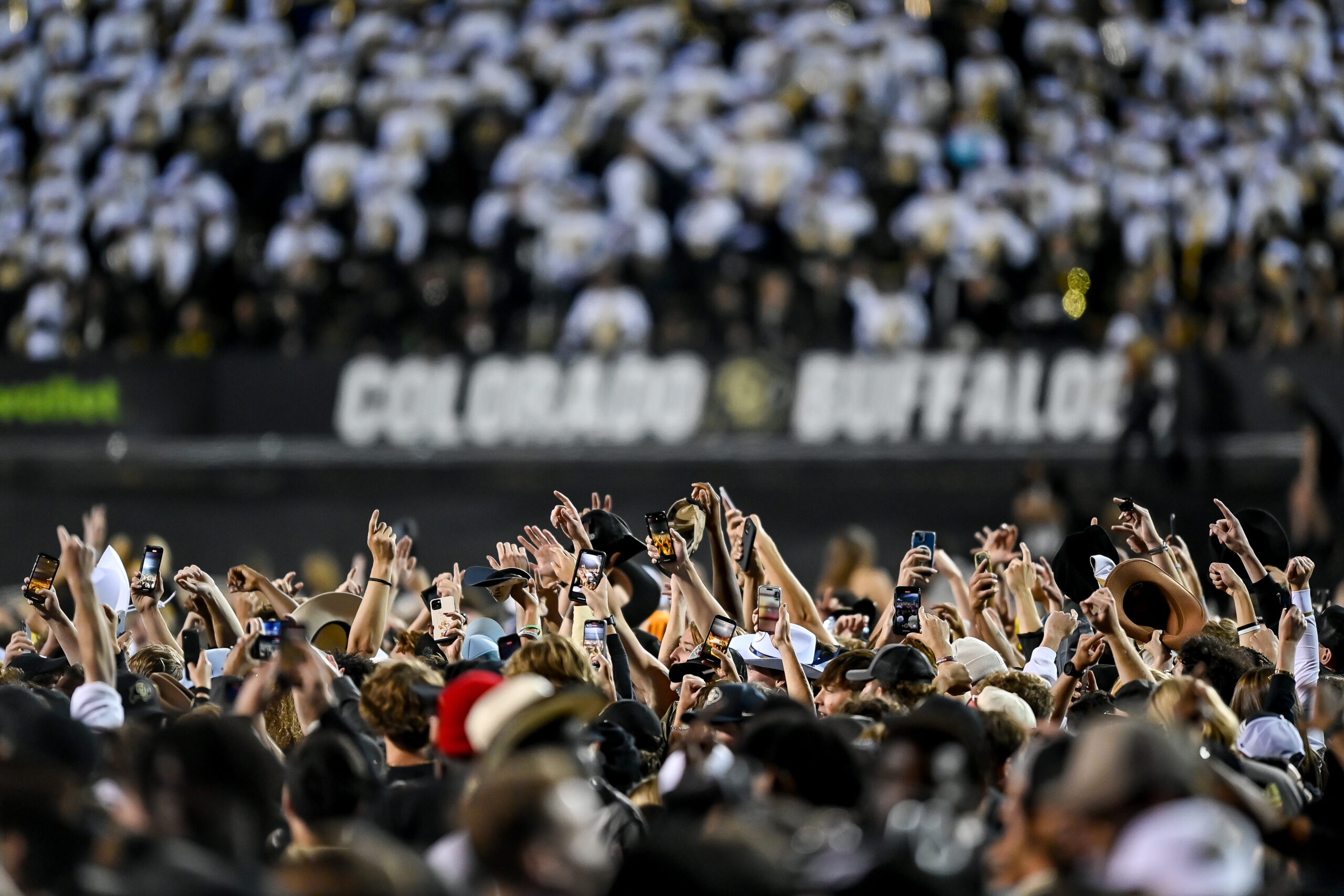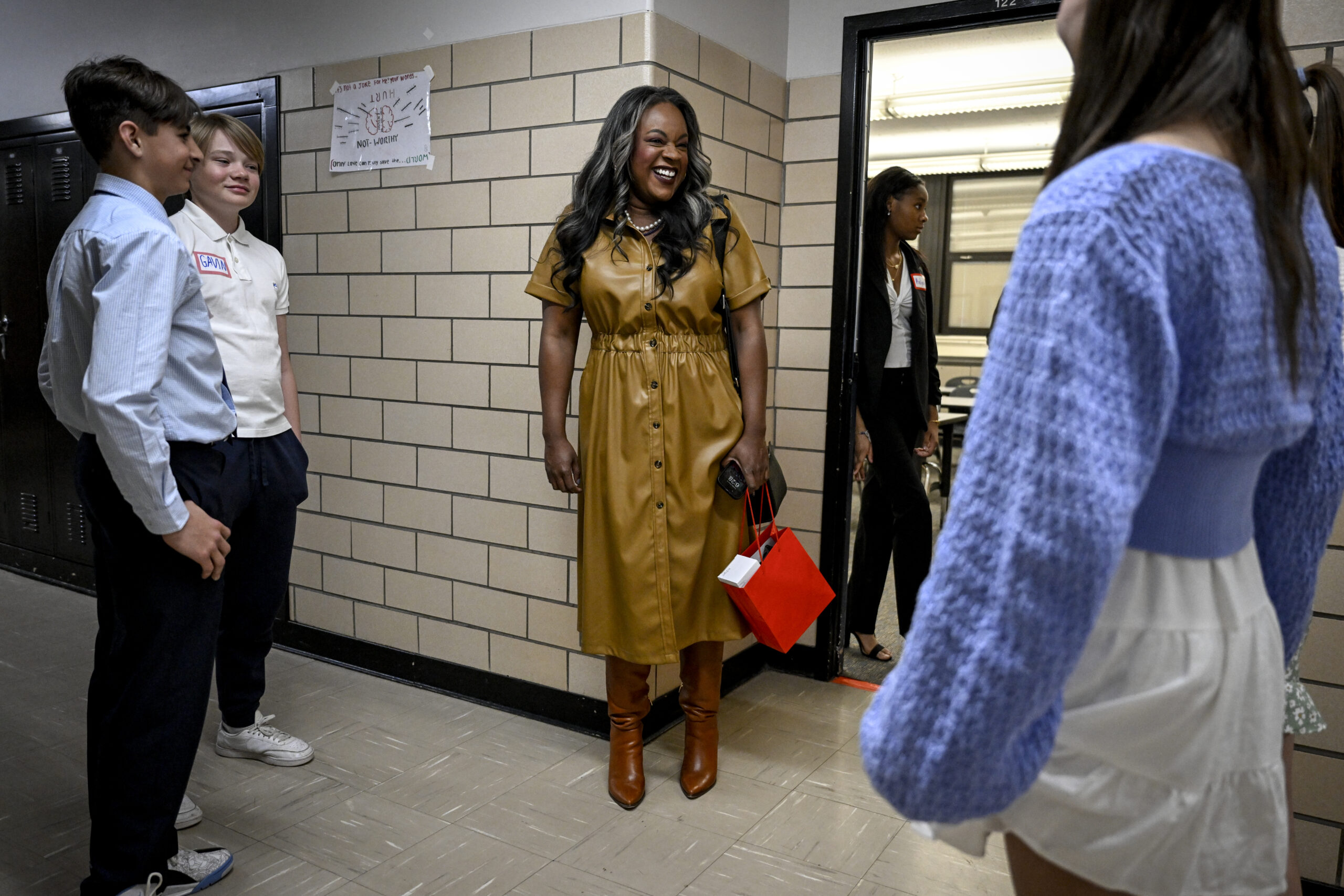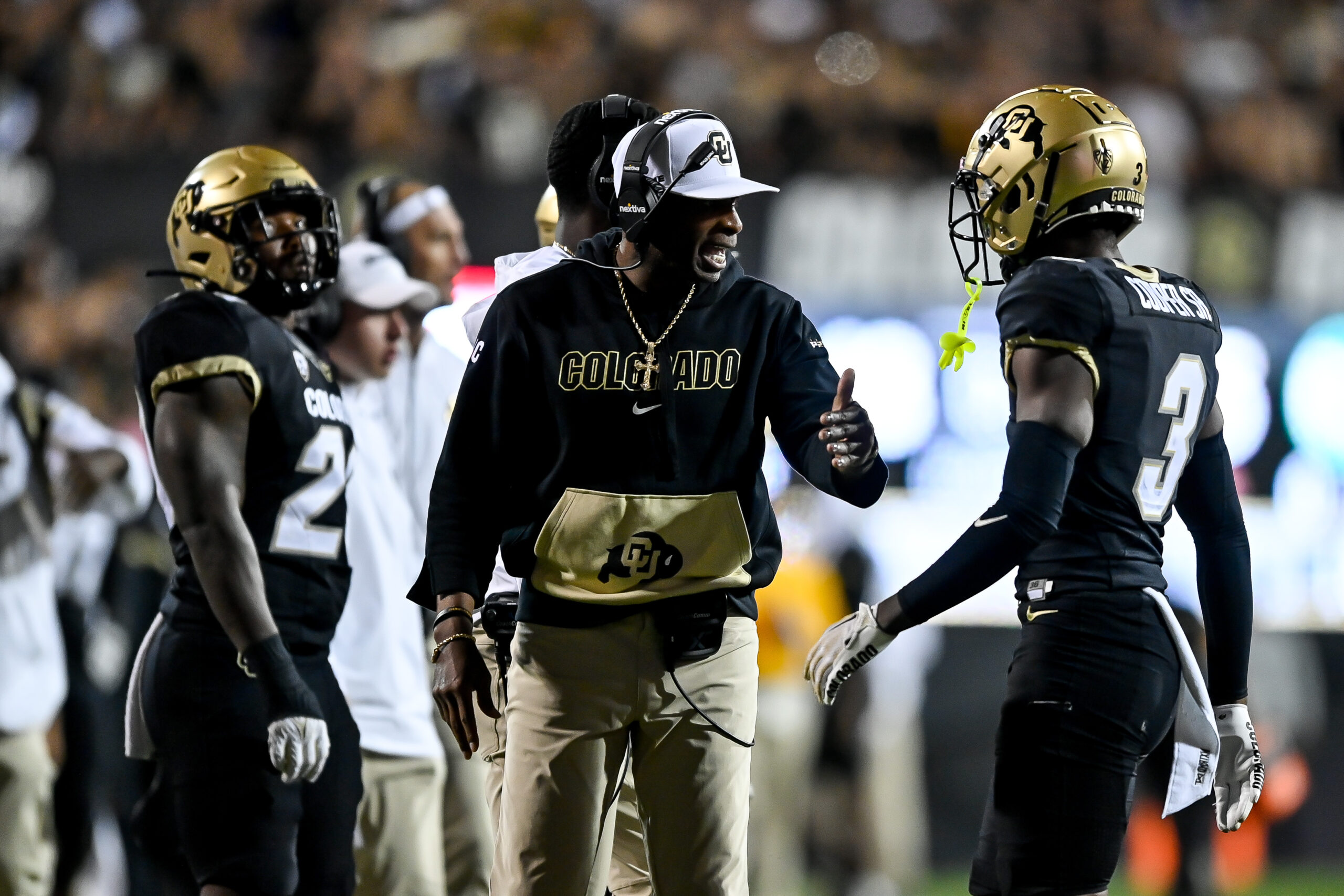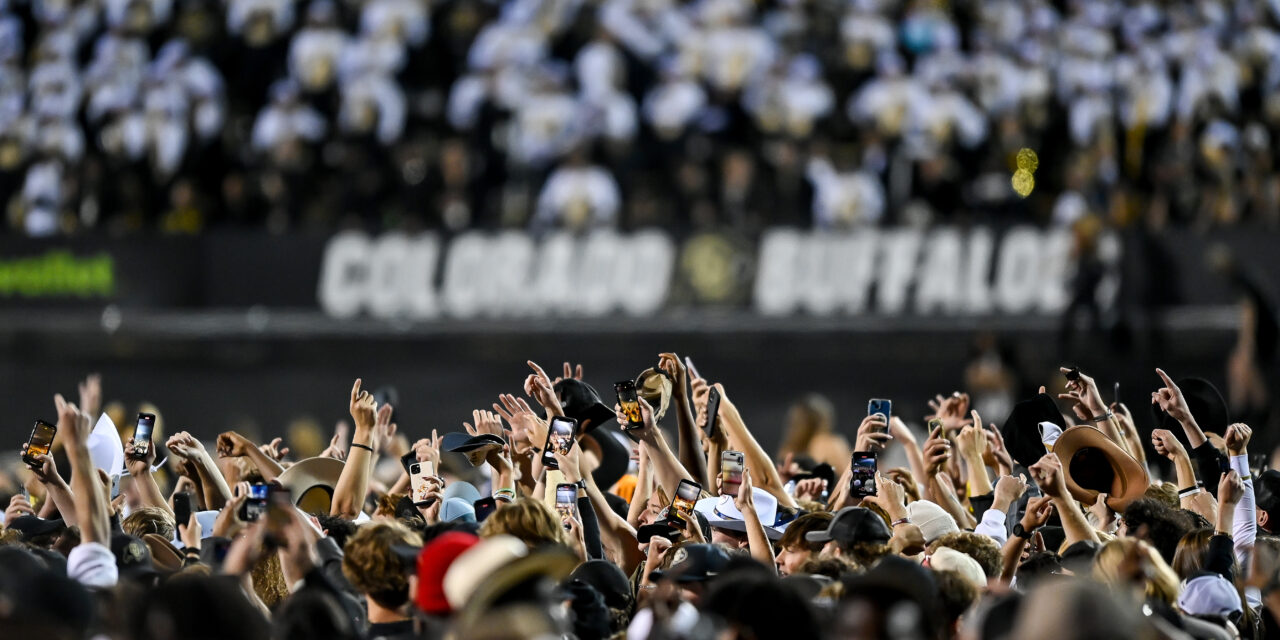“They tried to get all disrespectful. Respectfully, we gonna whup that a–.” — Lou Young
BOULDER, Colo. — The comedian Lou Young is channeling his inner Deion Sanders, a running bit that the popular YouTube creator has been on for a while. Young’s comic timing is impeccable. His ability to imitate the Colorado football coach is funny on the surface, but what’s clear is that Young doesn’t have to try that hard to get it right. His mannerisms are so well-known by now that when Young was invited to speak to the team, he didn’t do anything but solicit call-and-response answers from the crowd, just like Coach does before the game. Sanders loved it.
This particular chapter of Sanders’ American sporting life is arguably its most fascinating. The flashy multi-sport star has turned a college campus to one of the most popular places to be in America. Where Sanders goes, eyeballs, talented ballplayers and most specifically – money – follows.
Rappers Cam’ron, Master P and LA Clippers forward Kawhi Leonard are here. Rapper Offset came from a sleepover, same clothes, gang and all. Former NFL player Rob Gronkowski and actor Dwayne “The Rock” Johnson made live appearances during the pregame shows on campus. The week before, the hip-hop collective Wu-Tang Clan was in the building. For what we’re going to assume is a first in college football, Saturday night, rapper Lil Wayne walked the team out of the tunnel while he was performing.
What’s happening in Boulder is new in the sense that college football has never seen this kind of meteoric rise in popularity, never mind success in such a short time. And while technically, the Buffaloes program has never received this kind of attention, what’s happening at Folsom Field is much bigger than the Pac-12, Boulder County or even the picturesque mountains, visible from just about every place in town.
When Sanders first showed up on campus claiming that his designer luggage was a standard that they’d have to get used to, many people shrugged it off as standard trash talk from one of the greatest to ever do it. Sure, they might make a little splash and excite some people in the mountain time zone, but that’s about it.
One offseason and three wins later, this is Black America’s now. No doubt about it.
Following in the footsteps of teams such as the Georgetown Hoyas in the 1980s, UNLV and the Fab Five at Michigan in the 1990s and Miami Hurricanes football in the 2000s — it doesn’t matter who you rooted for before or even still do now, if you don’t even particularly care about college football, brothers and sisters, you probably care about Sanders and his team.
Speaking of, drama has definitely been aplenty in Sanders’ life and career, fairly or not. When he arrived at Jackson State University, it caused quite the stir for a whole host of reasons. Folks didn’t like how he ran his program, how he apparently treated other coaches or the general lack of deference he showed when it came to respecting the traditions of historically Black colleges. And while there’s obviously a lot of merit to that, let’s be clear, Sanders was a Hall of Famer in college and the pros before he ever put on a headset anywhere.
So, while there are definitely pockets of folks who don’t particularly appreciate how Sanders has made them feel, for the most part, he is beloved in the community and is bringing eyeballs to a team that most people watching couldn’t locate on a map.
Nobody on earth would have otherwise been watching two Black coaches, Sanders and Colorado State coach Jay Norvell, face off in an otherwise meaningless Week 3 rivalry game. Instead, it was the most talked about and best game of the weekend.
It cannot be understated how absolutely bizarre it is to see the residents of Boulder, Colorado, walking around with Prime T-shirts on, at a school that’s barely 5% Black.
His bodyguards wear shirts that say, “f— around and find out.” Folks are saying the locker room looks like entertainment agency Roc Nation brunch before games. Old crunchy, kitschy shops are selling random trinkets that say Prime on them, just to cash in on the fun. All this in a place where a local photographer, on the sidelines to take pictures of celebrities, lamented to a colleague, “I don’t recognize them. I don’t listen to rap.”

Dustin Bradford/Getty Images
Colorado exports a lot of things culturally. Blackness is not one of them. The stereotypical images that come to mind of friends sitting around a campfire listening to The Lumineers folk band and cozied up in their outdoorsman gear that they only wear to grocery shop are all very real.
Particularly in Boulder, you gotta look long and hard to find a Black person who isn’t an athlete or athlete adjacent. Seriously. Not that this is different from many college towns in America, but due to its proximity to Denver and relatively bucolic setting, it does sort of give off the “we live in a simulation” vibe — even if the local museum is proudly displaying a Daily Camera story with the headline Museum of Boulder creating exhibit, curriculum to proclaim Colorado’s Black History in its lobby and it’s not even February.
“2000 was when I started here. We had to find community. I thought there were Black people here. They were in the brochures,” Colorado state Rep. Leslie Herod said during lunch last week on the popular Pearl Street Mall in Boulder. “And then I went to my first class. It was an auditorium style classroom, huge campus, and there was nobody but me. So, I was very confused. In that first day though, a Black person stopped me on campus and said, ‘I know what you’re looking for. Come hang out at the UMC at noon. That’s where we all hang out.’ ”
Herod went to high school in nearby Colorado Springs, so she wasn’t entirely unfamiliar with the demographic layout of the state on the whole, but school itself took a good amount of getting used to. Luckily, after someone reached out to her, she found her village and went on to bigger and better things based on her college experience.
“I came here with all the hopes and dreams and thought I actually was going to be a cheerleader. And when I realized how white it was, how much work needed to happen, I got thrust into activism and I became a student activist,” Herod, 41, said. “I started running for office. I got all the folks at those different tables to run for office with me. We took over the student governments. We had the largest student government in the nation because of student fee autonomy. So, I ran a $36 million budget before I was 20 when I was a president. And I realized that there’s so many opportunities when you have access to the power and the wealth.”
Those last two things are immediately evident around town. There’s just no way that a city of that size should be supporting that many luxury outerwear establishments year-round. Everything feels expensive, even in God’s country. But there are real problems, too.
In 2018, the city sponsored an event called “Speak Out,” held by the Human Relations Commission and designed to give a voice to residents after a 2017 poll of Boulderites proved something most people there could have told you for years: members of minority groups feel uncomfortable in town and face a lot of discrimination based on a number of factors. It’s something that clearly trickles down to the university level, as well. A 2016 poll of students found that 62% of Black respondents said they did not feel supported or valued on campus.
Most recently, this week, a group of Black women wrote a letter to the Department of Education at the University of Colorado-Boulder, pointing out how years of a toxic work environment led multiple faculty members to leave. A troubling deep dive into the inner workings of an academic environment designed to emotionally tax Black women to the point of departure, the letter includes pages and pages of support from the Colorado education community.
“While the School of Education (and CU as a whole) might be intoxicated by the continued exploitation of black bodies during this football season as new waves of preeminence, distinction and prestige roll in, bolstered by 60M [$60 million] in additional revenue on merchandise alone and off the bondage and servitude of new black student athletes (who of course, have a host of support and resources for holistic being not afforded to the larger student body), we remind our community members that other students, faculty and staff also inhabit these spaces of higher education and are being abused brazenly and without apology,” the body of the correspondence reads.
“It is beyond horrendous for this institution to put its funding, faculty, and focus on frivolous activities such as football or public events while enforcing internal colonial rhetoric amongst their staff and students,” student Elaina Olvera wrote.
“It is an endemic issue to the development of academic identity for marginalized students of all ages, and it should be taken with serious consideration from a predominantly white, wealthy university that continues to profit hand over fist because of the labor of BIPOC employees, including the head football coach,” wrote state Rep. Tim Hernández. “I call on the leadership of the CU system to investigate its hiring practices and experiences of BIPOC faculty and staff should they ever seek to serve or truly create safe, sustainable learning conditions for the ever-increasing nonwhite K-12 student population in the state of Colorado.”
Football isn’t going to fix years of institutionalized discrimination.
Whether anyone believes or can prove that Colorado is a better or worse job than Jackson State from a football visibility standpoint is a different matter than the situations at these schools physically. In terms of lifestyle, they’re basically polar opposites for Sanders. But because Sanders is who he is, as far as a lot of people go, he fits right in. He’s rich, he’s flashy and enjoys the outdoors. But he’s not only working for himself, contrary to much criticism.
“He has been intentional about building Black community outside of this space,” Herod explained. “When he first came to Colorado, he reached out to the members of the Black caucus, especially myself and Sen. James Coleman, who’s my colleague, and said, ‘What’s up? What’s up with Colorado, what’s up with this place?’ I’m a pretty known alumni here, so it was like, ‘Let’s talk.’ We sat down multiple times and he was like, ‘Well, what can I do? What can I bring? What does this look like?’ “

AAron Ontiveroz/MediaNews Group/The Denver Post via Getty Images
“He [Sanders] has been intentional about building Black community outside of this space. When he first came to Colorado, he reached out to the members of the Black caucus, especially myself and Sen. James Coleman, who’s my colleague, and said, ‘What’s up? What’s up with Colorado, what’s up with this place?’ We sat down multiple times and he was like, ‘Well, what can I do? What can I bring? What does this look like?’ ”
— Leslie Herod
At that Speak Out function so many years back, a mother got up and told a story of how her Black daughter was processing things at school. She was told that her skills were too professional and made the other kids look bad. That’s what we’re dealing with. Sure, the town had a Black mayor, but Penfield Tate II is also the only one. A beautiful mural of his face was created on the side of City Hall after colleagues pushed for some type of honor in his name.
In contrast to Jackson, Mississippi, where Sanders coached at Jackson State for three years, and many places around the Southwestern Athletic Conference, one might think that bringing that many young Black athletes to town with so much pomp and circumstance could end up being risky if not downright harmful if for whatever reason things don’t work out. So, it’s one thing for a coach to do a bunch of glad-handing well-wishers and others who might eventually become backstabbers. It’s quite another thing to show up and seek out lawmakers to help pass legislation that helps everyone involved, including your own players and students.
“We started talking about the fact that I ran with James, the name, image and likeness bill, the initial name, image and likeness bill for the students. And that was a conversation that we were having when I was on campus. So, when I was elected, it was no question about whether or not I was going to run that bill or if we need to pass it,” Herod noted. “We passed it and needed tweaks. And [Sanders] came back and he lobbied us and talked about the importance of it. And I think he in fact brought some of the conversation forward about why it needed to change.”
More generally, the culture of Boulder very much has a look and feel. Sanders doesn’t fit that culture, but like many of his life’s adventures, that mold has ended up fitting to him.
“He’s being extra Black with it. That’s community. Literally, I’d never seen these kids wearing black and gold and now they’re wearing black and gold and everyone’s talking about it,” Herod said. “Sen. Coleman’s got two little ones who are very athletic and it’s just like now they want to come here.”

Dustin Bradford/Getty Images
“An American icon.”
Those were the words that Gus Johnson, lead play-by-play announcer for Fox Sports, used to describe Sanders after the Buffaloes beat TCU on Sept. 2. To the naked ear, it sounds hyperbolic. But anyone who’s been alive as long as Sanders has been doing pretty much anything, knows it’s true.
His personality sparks such a specific type of haterade from onlookers it’s almost comical to watch. If you wanted to spend hours of your life watching or reading people eat their words about Sanders, you could. But this latest chapter is genuinely impressive, even if operating as a program with an undefined goal.
The Georgetown Hoyas were known for graduating tough players and specializing in centers. The Fab Five were a cultural force that reminded America that the athletes are the reason anyone shows up to watch. UNLV was a hard-nosed operation that flew in the face of blue-blooded Duke in a time when they felt unbeatable. The Miami Hurricanes all looked like men among boys when they took the gridiron.
There was something sort of obvious, even if rote, about the Black community’s natural rooting interest in those teams. Sanders’ operation feels completely different, even if the success isn’t necessarily grand. The undercurrent of most of the criticism of what they do feels rooted in some form of racism, even if not outright. Tell me again, what exactly the problem is, ever, with Sanders?
The answers are often all over the place, with shifting goalposts that ultimately seem to just add up to a strange form of jealousy that feels repeatedly bizarre considering who we’re talking about. The implication from various people that this is all some kind of snake oil or scam televangelist operation falls apart when you remember that, hello, man has been winning for a long time.
As for comparisons to some of the most important teams in pop culture history, the coach hopes that his kids understand just how valuable this moment is to people other than themselves.
“Well, first of all, these kids weren’t even born [then], so they don’t understand that. Dennis Thurman and some of the older coaches like myself, we understand that and how dynamic and how much of a blessing that is to even be mentioning those likes,” Sanders said after the Buffs pulled out a double overtime win at Folsom Field. “It is tremendous. It’s not a burden whatsoever, it’s a blessing and we are thankful for that. But I don’t think our young men inside the locker room understand the moment. That’s what I told them in that last series: Guys, this is a moment you would never forget. Let’s maximize this moment, and they went out and did it.”
The idea that someone as clearly influential as Sanders is somehow overhyped is baffling. Nearly 9 million people tuned in to watch them beat Nebraska. That was up from 7.5 million against TCU on Sept. 2. The double overtime thriller against Colorado State was the fifth-most watched college football game in ESPN’s history at 9.3 million viewers. They’re legitimately pumping millions of dollars into the Boulder economy. By no means is this a renegade program.
What will be interesting to see in future is exactly what Sanders himself considers success. There are plenty of different options to take. Is it to win a national title? Make it back to regular bowl games? Win Heismans? Graduate players? Or turn guys into pros?
All of the above sounds like the easy option, or rather the most bombastic, but there’s something about the current moment that makes all those inquiries feel pointless. Sanders has single-handedly saved college football in an era in which nobody really knows what the sport is going to be.
Right now, in Boulder, none of that matters. Across the country, our people are tuned in. And as Sanders continues to create safe spaces for young, outspoken athletes, it will only grow.
“When you’re that young — and all of us were young one day, some of us are still young and naive — we don’t understand. These moments are just slipping by slowly but surely, and we got to grasp them,” Sanders said after beating Colorado State. “What happened and what transpired today was incredible. It really was from the start to the finish of the day.”
Why people are trying so hard not to enjoy it is perplexing.





